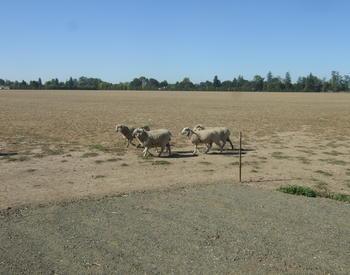Manage Manure and Mud (in English)
Transcript
Welcome to living on the land. Your source of useful information for Eastern Oregon Country living. Brought to you by your Oregon State University Extension Service. Livestock produce a lot of manure. For example, an average horse weighing 1000lbs will produce up to 55 pounds of manure per day, with an annual production of 8 to 9 tons. That's a lot of poo. What can you do with it? Well, you might compost it. A well managed compost pile stabilizes nitrates in the manure and reduces the potential for environmental harm. It can also kill pathogens and weed seeds if kept above a critical temperature for a sufficient period of time. And besides, turning livestock waste into garden gold. Composting reduces the volume of manure by 2/3, and that's good. Another messy livestock issue is mud. You want to avoid muddy pens, which can cause foot problems like thrush or injuries from slipping. Create an all season pin with good drainage and footing. So plan ahead for the muddy season. Check for areas that collect water. Be sure your barn roof gutters divert away from animal pens. And consider replacing muddy areas with gravel, sand, or other materials. Your livestock will appreciate it. You've been listening to living on the land. For more details on pasture and livestock management, contact your local Oregon State University extension agent soil and Water Conservation District, or Oregon Department of Agriculture.
This podcast episode is part of the Living on the Land series. It provides concise information on the basics of managing livestock in winter, including use of sound production practices. Particularly for the region east of the Cascade Mountains.
This is from the Living on the Land series. Download the related PDF - Living on the Land: Winter Livestock Care
The phrase “Living on The Land” is used with permission from Living on The Land Stewardship for Small Acreage, © 2008, UNCE/WSARE.

 Extension Service
Extension Service